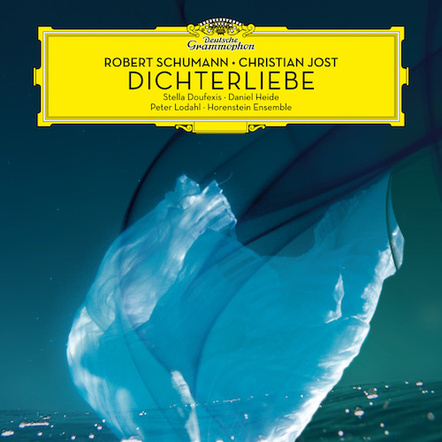New York, NY (Top40 Charts) Robert Schumann's talismanic song-cycle Dichterliebe has been recomposed by German composer and conductor Christian Jost. The results can now be heard on an album from Deutsche Grammophon which pairs the new score with recordings of Schumann's Dichterliebe and the Liederkreis op.39 made by Jost's wife, mezzo-soprano
Stella Doufexis, a year before her tragic death from cancer. Jost's reimagined Dichterliebe, performed by tenor
Peter Lodahl and the Horenstein Ensemble, casts new light on the shifting moods of Schumann's composition. Dichterliebe is set for worldwide release on April 12 via Deutsche Grammophon/Universal Music.
Jointly commissioned by the Konzerthaus Berlin and the Copenhagen Opera Festival, Christian Jost's reinterpretation of Schumann's Dichterliebe (A Poet's Love) was first performed in Berlin in October of 2017 by the artists who appear on this Deutsche Grammophon world premiere recording: Danish tenor
Peter Lodahl and the Konzerthaus Berlin's own Horenstein Ensemble.
In Jost's Dichterliebe, the Romantic art song is fused with elements of the composer's own contemporary style. The solo piano accompaniment is transformed into writing for a nine-piece chamber ensemble and Schumann's cycle is doubled in length, thanks to the addition of newly-composed instrumental passages that link together the sixteen originally self-contained songs. As Jost explains, these transitions form "a harmonic sea, in which the songs are individual islands woven organically into a larger, newly created composition".
One of those islands, "Hör ich das Liedchen klingen" ("When I hear the sound of the song"), disrupts the cycle's initial flow of hope and optimism, emerging as the recomposition's central meditation on the nature of existence. The song is followed here by the postlude from Schumann's original score, repositioned and reworked to evoke the "dark longing" of Heine's text.
"It is very clear that the loved one is lost, crazy, under a spell, and in a totally different sphere," observes Christian Jost. "And from that point onwards in my piece, the instrumentation is also much more fragmented. The sounds are more fragile, and are played with more fragility." In an act of great courage he also confronts the fragility of life and the sting of death in "Ich hab' im Traum geweinet" ("I wept in my dreams").
Jost originally came up with the idea of reworking Dichterliebe for his wife to perform. As it turned out, the writing process, charged with the pain of her death in December 2015, raised essential questions about the nature of creativity and the role played by suffering in art.
"There were moments when due to my personal crisis, or the tragic events in my life and the loss of my beloved wife, composing led me to what was preserved in myself," he observes. "With 'Ich hab' im Traum geweinet' I wanted to enter, even drill a way into a particular state in myself." The recycling of part of Schumann's accompaniment as a rhythmic riff enabled Jost to penetrate the song's heart. "The violence of this piece is the pain," he explains. "Even if it is a very personal concern, in the end, the personal life and biography of the composer shouldn't necessarily be decisive factors when it comes to the quality of a piece. But then again, none of us lives in a vacuum, uninfluenced by things that, existentially, are deeply moving, destructive and totally incomprehensible."
Jost's late wife
Stella Doufexis recorded Schumann's Dichterliebe and the Liederkreis op.39 just over a year before her death, and her moving performances appear on this album alongside his recomposition. Both works are more commonly associated with the male voice, and it is fascinating to hear the different expressive nuances brought to the music and to Eichendorff's poetry by Doufexis. She and Jost worked intensively on both cycles before the recording and had many a discussion about how to interpret them. "She approached these Lieder as if they were French chansons," recalls the composer. "Because of that, and because her readings avoid pathos, the songs acquire incredible depth."
Mezzo-soprano Doufexis was acclaimed as a recitalist as well as for her work in opera and oratorio. Her versatility enabled her to shine in everything from early music to contemporary compositions. In the opera house she was equally adept at both comedy and tragedy, her roles ranging from Cherubino and Octavian to the title role in the world premiere of Jost's Hamlet.
Christian Jost is a leading figure on today's contemporary music scene. Born in Trier in 1963, he studied in Cologne and at the San Francisco Conservatory of Music. His rich catalogue includes a series of much lauded operas - including Rote Laterne (for Zurich Opera) and the forthcoming Egmont (for Vienna's Theater an der Wien) - and a wealth of orchestral works, with concertos such as
Heart of Darkness, premiered by the Berliner Philharmoniker, forming a core genre in his output. Well established in the European operatic and orchestral repertoire today, his works are regularly performed at venues around the globe. Jost is also an accomplished conductor and is frequently invited to direct orchestras such as the Essener Philharmoniker, Netherlands Philharmonic Orchestra and Shanghai Chinese Orchestra.
























